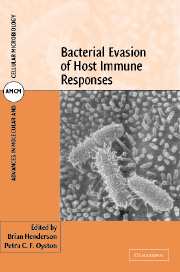Preface
Published online by Cambridge University Press: 13 August 2009
Summary
From birth we are protected from bacterial infections by the complex system of cells and cell products, which have functional and signalling properties, known collectively as immunity. The immune system has three major functions: (1) the ability to recognise infectious agents such as bacteria; (2) the capacity to kill these infecting organisms; and (3) the integration of (1) and (2) through specific cell–cell signalling. It is now recognised that the nature of our immune systems has been shaped in the crucible of evolution by interactions with infectious agents. It is also emerging that the various organisms that can infect us have evolved multiple mechanisms to evade both arms of our immune system – innate and adaptive immunity.
This book describes some of the emerging mechanisms employed by bacteria to evade both humoral and cellular immunity. The first section deals with novel aspects of the recognition of, and the response to, bacteria by a key cell population – dendritic cells (e.g., through Toll-like receptors), and by lymphocytes via the nonpolymorphic CD1 MHC molecules that recognise nonpeptidic antigens. The final chapter in this section describes natural resistance-associated macrophage protein (NRAMP), a metal ion transporter important in susceptibility to infection by mycobacteria. Mycobacteria also encode NRAMP-like proteins revealing another twist in the ongoing battle between bacteria and their hosts for essential metal ions such as iron and zinc.
In the second section attention switches to the ability bacteria have to evade humoral immunity.
- Type
- Chapter
- Information
- Bacterial Evasion of Host Immune Responses , pp. xv - xviPublisher: Cambridge University PressPrint publication year: 2003

